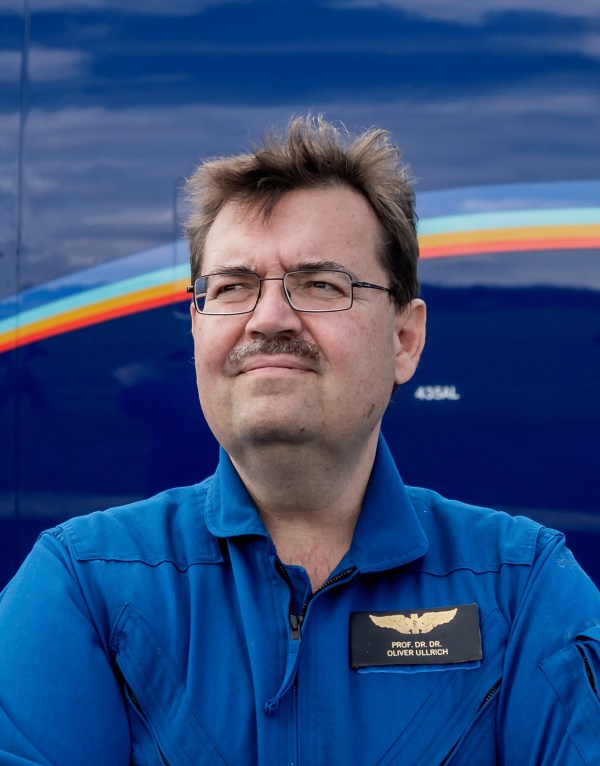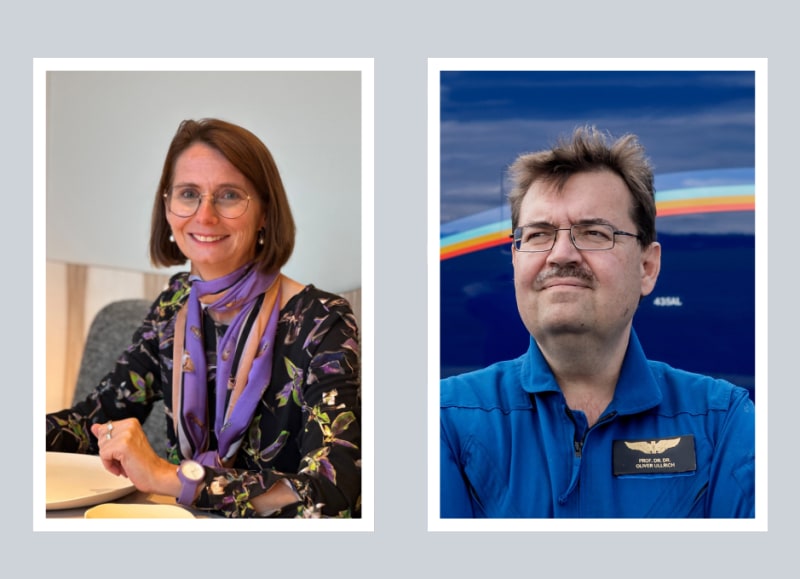-
3. April 2025
Switzerland’s Space Sector: Perspectives from its Leaders
Switzerland Innovation Park Zurich interviewed two key figures in the Swiss space sector, based in the Greater Zurich Area: Prof. Dr. Dr. Oliver Ullrich, Director of the UZH Space Hub which is located on our innovation campus in the refurbished Hangar 4, and Dr. Nanja Strecker, Managing Director of ESA BIC Switzerland and Co-Lead of ETH Zurich I Space.
Read their insights on the current state of the space sector in Switzerland and their mid-to-long-term outlook below.
VISION AND STRATEGY FOR SPACE RESEARCH
What is the overarching vision of UZH Space Hub for the next 5/10 years?
Prof. Dr. Dr. Oliver Ullrich: The UZH Space Hub, established in 2018 by the University of Zurich Innovation Hub alongside the Switzerland Innovation Park Zurich, plays a key role in space innovation, coinciding with the airfield area transformation in Dübendorf. Our vision is to be a major driver of the New Space Economy through the strong regional alliance of the Center for Space Aviation, leveraging the unique location advantage of combining an airfield with an innovation park. Central to this are collaboration, education, science, and the courage to embrace radically new developments. Dübendorf is our home base, the core, the starting point, the cradle, as it has been for aviation 100 years ago.
What is the overarching vision of ETH Zurich I Space for the next 5/10 years?
Dr. Nanja Strecker: Our vision for ETH Zurich I Space is to drive innovation, research, and education in space science and technology. We actively engage with global space agencies, start-ups, and other leading institutions to contribute to Switzerland’s and Europe’s leadership in space. Our mission is to address critical challenges in space, train the next generation of leaders, and foster technological innovation for scientific and societal impact.
How do you see Switzerland's role in the global space industry evolving?
Prof. Dr. Dr. Oliver Ullrich: We are actively and vigorously working to ensure that Switzerland assumes a leading role in the New Space Economy. Starlab Space, an international joint venture of Airbus, Voyager Space, Mitsubishi and MDA Space, building the successors of the ISS, has decided to establish its European site at our innovation park and has signed a memorandum of understanding with the Center for Space & Aviation Switzerland and Liechtenstein (CSA) and the Switzerland Innovation Park Zurich foundation (IPZ) about a Payload Control & Operations Center, a User Support Center including R&D flights and a Science Park with focus on biotechnology, biomedicine and pharmaceuticals. With this perspective, Switzerland can take a leading position in space industry.
Dr. Nanja Strecker: Research institutions in Switzerland have been involved in key space missions, e.g., ETH Zurich is a key partner in ESA’s large class mission, LISA, to detect gravitational waves in space; the University of Bern has built several scientific instruments for key NASA and ESA missions. Already today, Switzerland is a leader in various niche areas of the global space industry, e.g. the electrical motors of all NASA robots in space stem from a company in Switzerland (maxon). Consequently, Switzerland plays an important niche role, both in industry and academia. >>
COLLABORATION AND PARTNERSHIPS
How does the UZH Space Hub collaborate with international partners such as ESA or NASA?
Prof. Dr. Dr. Oliver Ullrich: The teams at the UZH Space Hub boast extensive experience in collaborating with national and international academic and industrial partners, as well as in public-private partnerships. The UZH Space Hub collaborates with NASA under various Space Act Agreements and is involved in several ESA research missions, sometimes in a leading role, such as JUNO, EUCLID, and the upcoming LISA and ARRAKIHS missions. The Geographic Institute of the University of Zurich is the exclusive Swiss partner of NASA and ESA, and there has been a long-standing Space Act Agreement with NASA Kennedy Space Center focusing on cooperation in Space Life Sciences.
How does ETH Zurich collaborate with international partners such as ESA or NASA?
Dr. Nanja Strecker: ETH Zurich researchers have been collaborating with ESA and NASA on various missions and projects, be it in the upstream segment “in space” or downstream “using satellite images on Earth”. ETH Zurich was a key contributor to NASA’s James Webb Telescope, or NASA Insight, where ETH researchers detected the first Mars quakes. Presently, various collaboration projects with ESA are on-going, ranging from scientific missions to running the ESA Business Incubation Center for Switzerland, which is supporting start-ups with a space connection. >>

Prof. Dr. Dr. Oliver Ullrich, UZH Space Hub
Which current or upcoming collaborations between academia and industry do you find particularly exciting? Why?
Prof. Dr. Dr. Oliver Ullrich: The largest public-private partnership by far is the one between the Center for Space and Aviation and the Switzerland Innovation Park Zurich on the one hand and the Starlab consortium on the other. The UZH Space Hub also has a partnership with Swiss SkyLab; this federal foundation constitutes the Civil Research Flight Facility of the Center for Space and Aviation.
Dr. Nanja Strecker: At certain projects in the realm of space ETH is already collaborating with industry. Lately, companies from the non-space sector have reached out to ETH for space research projects. In Fall 2024, ETH Zurich launched the first ever master’s program in Switzerland related to space: MSc in Space Systems. In this context, it is important to involve industry early on, given most students will later work in the global space industry.
How do you see the role of start-ups and private companies in advancing space research?
Prof. Dr. Dr. Oliver Ullrich: As the International Space Station (ISS) is set to be decommissioned by 2030, the privatization of LEO will begin. Pioneering space enterprises and large private stations like Starlab, Axiom, and Orbital Reef will lead LEO's utilization, significantly lowering transportation and operational costs. These new private stations will not only conduct research but also focus on development and large-scale manufacturing. Start-ups and private companies play a crucial role in advancing space research and make the field more dynamic, competitive, and innovative.
Dr. Nanja Strecker: Space research happens in academia and in R&D departments of industry, of which companies are more short- and mid-term focused and academia more long-term with more freedom. In contrast, the mission of any start-up is to grow into healthy businesses (not to do research), but with their activities start-ups can advance the space sector overall, as we can see in the US (e.g. SpaceX, Intuitive Machines) and Europe (e.g. The Exploration Company, ClearSpace). >>
INNOVATION AND RESEARCH FOCUS
What are some of the most promising innovations coming out of your respective institutions?
Prof. Dr. Dr. Oliver Ullrich: With its 35 high ranked research groups from the fields of Earth observation, space life sciences, astrophysics and supercomputing, autonomous flying and navigation of unmanned aerial vehicles, green aviation and space sustainability, the UZH Space Hub is an endless source of innovative ideas. Promising developments are coming from autonomous navigation, Earth observation / sensor technology and of course life sciences, in particular space biotechnology, where major breakthroughs in medicine are expected. If one day individual human tissue and organs can be produced safely, cheaply and quickly in microgravity, this would be a revolution in medicine.
Dr. Nanja Strecker: ETH Zurich is very strong in robotics, and robotics are key for the space sector, to explore the moon and other planets. For example, Anybotics is an ETH spin-off and ESA BIC CH alumnus, and their robot was used for the GLIMPSE student project which won ESA’s resource challenge. Another area where ETH Zurich is strong is optical communications, or photonics. There are various ETH spin-offs in this domain such as Menhir Photonics which conducts business with the space sector, providing a precision RF microwave solution for 5G/6G.
EDUCATION AND TALENT DEVELOPMENT
What is your strategy to attract and train the next generation of space scientists and engineers?
Prof. Dr. Dr. Oliver Ullrich: At UZH, the topic of space is widely incorporated into the curriculum of various degree programs through diverse courses. The variety of research and teaching emphasizes that space is a matter concerning all aspects of humanity, a diversity that is particularly embraced and experienced at UZH as a comprehensive university. It's about stepping out of our bubble in space and establishing connections and bridges to all disciplines.
Dr. Nanja Strecker: ETH Zurich launched the MSc in Space Systems in fall 2024, the first ever space related master’s degree in Switzerland. The three key education pillars are “systems”, “data” and “sustainability” – all important for the New Space Economy. We received a large number of applications for the first cohort of students, and even more for the second cohort, starting in fall 2025. Most of these students will go into industry and some will stay in academia. In addition, and for other students interested in space, we offer the “Lecture series: Space Research and Exploration” at ETH.
What advice would you give to students or young professionals who want to pursue a career in space?
Prof. Dr. Dr. Oliver Ullrich: Join us and start a journey full of curiosity and very hard work.
Dr. Nanja Strecker: Whether a student in the MSc in Space Systems at ETH or studying something else, the advice would be to explore the space sector via an internship in a company or start-up, or an academic group. ESA also has an internship program – which gives a good opportunity to explore career options in the space sector. ETH Zurich I Space and Space Exchange Switzerland (SXS), of which ETH is a partner, both help to provide consulting to students with regards to exploring a career in space. >>

Dr. Nanja Strecker (ETH Zurich I Space, ESA BIC Switzerland)
SUSTAINABILITY AND ETHICAL CONSIDERATIONS
How do you address concerns related to space debris and environmental impact?
Prof. Dr. Dr. Oliver Ullrich: Addressing space debris and environmental impacts is essential for sustainable development of the space economy. Strategies are enhanced tracking, debris mitigation standards, active debris removal, sustainable launch practices and international cooperation. Space laws are currently being developed in many countries, as in Switzerland. An international space flight control, a kind of “skyguide for low Earth orbit”, will certainly also be developed in the future. However, it should not be forgotten that the debris problem has been massively triggered by the testing of anti-satellite weapons in the past.
Dr. Nanja Strecker: “Sustainability” is a key pillar of the new MSc in Space Systems at ETH. This means that students and hence the future workforce in the space sector are made aware of the topic during their studies. As part of ESA BIC Switzerland and for space related start-ups across Switzerland, sustainability has become an evaluation criterion during the admission to the program and is pursued during the two years of the start-up's incubation period to make those companies aware of the topic, which do not have sustainability inherent in their business model yet.
What ethical considerations do you believe are crucial in the future of human space exploration?
Prof. Dr. Dr. Oliver Ullrich: Here, I do not wish to offer definitive answers, but rather to understand this question as a central and crucial task. Today, experimental-empirical methods dominate the exploration of space and the creation of the necessary technologies. However, integrating theological, philosophical, and humanities and cultural insights are crucial for a comprehensive understanding of human spaceflight. As part of a comprehensive university, it is therefore a central concern of the Space Hub at the University of Zurich, to incorporate as many dimensions as possible. Interdisciplinary bridges will help to understand space exploration in the context of sustainable development aimed at all humanity. It is particularly important to me that it is understood that space is for everyone, for all of humanity. We must therefore spare no effort to involve all countries, whether rich or poor, in the benefits of space. I personally believe that we can only become an interplanetary species when we humans see ourselves as humanity and act accordingly.
Dr. Nanja Strecker: Ethical considerations include, but are not limited to, the level of risk we are willing to accept for astronauts. A mission to Mars would expose them to high radiation, increasing their lifetime cancer risk - where do we draw the line on what is acceptable? Or would it be ethical to send people on a one-way trip, knowing they may never return? There is also the question of whether space should remain purely for peaceful exploration or if militarization is inevitable. Additionally, planetary protection is crucial. If we introduce Earth microbes to Mars via humans, we could unknowingly wipe out potential Martian life. Conversely, could something brought back from Mars by astronauts pose a risk to life on Earth?
FUTURE OF SWITZERLAND AS A SPACE HUB
How is Switzerland positioning itself as a leader in the European and global space industry?
Prof. Dr. Dr. Oliver Ullrich: Since 2011, Switzerland has consistently led the world in innovation. Positioned at the heart of Europe, this high-tech nation boasts a superb education system, economic resilience, reasonable taxation, and a unique quality of life. The Switzerland Innovation Park Zurich and the UZH Space Hub offer a unique synthesis in Europe: an innovation hub with a focus on aerospace, complete with end-to-end services and scalable development opportunities near top-tier universities and research institutions.
Dr. Nanja Strecker: With ETH Zurich declaring the topic of space as a key priority for the university over the next years – in education, research or technology transfer – we aim to position Switzerland as a key player in the European and global space ecosystem. Hiring Prof. Dr. Thomas Zurbuchen, the former NASA science director, as Director of ETH Zurich I Space was one step on this way.
Which Swiss-led space initiatives or projects will make a significant impact internationally in the short to mid-term future?
Prof. Dr. Dr. Oliver Ullrich: In addition to major government initiatives such as the new European Space Deep-Tech Innovation Centre ESDI in the Switzerland Innovation Park Innovaare, a joint venture between ESA and the Paul Scherrer Institute PSI, a major supra-regional initiative has just been launched bottom-up: The Center for Space and Aviation Switzerland and Liechtenstein (CSA), a federal foundation, under the strategic direction of the Zurich cantonal government's decision on Space as a cantonal flagship, aims to advance the New Space Economy through a unified approach. In 2024, 8 leading institutions from the Greater Zurich Area and the Rhine Valley and from two countries merged their space expertise and infrastructure to establish the CSA (www.spacevalley.ch).
Dr. Nanja Strecker: Talking about short-to-mid-term impact, one would need to think more about large companies and start-ups. Universities are inherently mid-term rather long-term oriented. Having said this: one short to mid-term example from ETH would be graduates from the new MSc in Space Systems. We clearly hope that they have an impact in the space sector in Switzerland and abroad, e.g. to increase the density of space related start-ups in Switzerland, to foster commercial space in Europe, etc.
How do you perceive Switzerland Innovation Park Zurich in the future of space in Switzerland?
Prof. Dr. Dr. Oliver Ullrich: It's not about how we perceive the Switzerland Innovation Park Zurich; it's solely about shaping the future of the Space Economy in Switzerland with and at the Switzerland Innovation Park Zurich. The Switzerland Innovation Park Zurich – that's all of us.
Dr. Nanja Strecker: We think that the park in Dübendorf should play an important role with regards to space activities in Switzerland. ARIS, a space-focused student organization with numerous ETH students is already present there. Students from the MSc in Space Systems had classes in the ETH Hangar in Dübendorf already and recently executed the can-sat team exercise on the Dübendorf airfield and innovation park. Some ESA BIC CH supported start-ups have their offices at the Switzerland Innovation Park Zurich already, and we hope that the density of space-related start-ups (and companies overall) significantly increases in the future. Finally, we expect to have projects between ETH Zurich research groups and companies on the park in the future – collaboration between industry and academia, what the park is inherently meant to be for.

